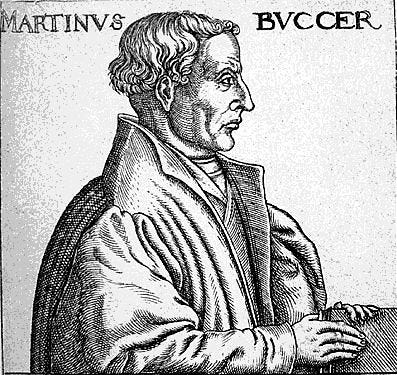Martin Bucer: The Forgotten Reformer
Bucer needs to be reinstated in the great Hall of Fame of Reformers!
When we consider the most prominent Reformation figures, we think of Martin Luther, John Calvin, and Ulrich Zwingli. However, I want to argue that we are missing a critical fourth Reformational titan.
The Importance of History and Learning from History
But before we delve into the life of Martin Bucer, I’d like to offer a couple of premises on how to think of history and historical figures.
First, if you grew up as I did in a very generic Christian church, then you know how evangelicals treat history. History is often despised. It is minimized in the modern evangelical experience. The idea that we can learn from the past is passé.
It was only in my college years that I became interested in history. I took a class on Church History and discovered that we are part of a greater story. Studying history actually opened my eyes to the Protestant Reformation. I remember when I was 16 years old, having to fill out a form to enter a school in Brazil. The form asked the following question: “What is your religious affiliation?” The three options I remember were Roman Catholic, Protestant, or Other. I knew what a Roman Catholic was, and I wasn’t one, but I had no idea what a Protestant was. I asked my uncle to define a Protestant, and instead of answering the question, he simply urged me to “Just sign under “other.” My uncle preferred the “no-label” category, which is a label in and of itself. But what is Protestantism? Protestantism is not just a movement to protest Roman Catholicism; Protestantism seeks the purity of the Church. The true Protestant is a lover of the Church. The Protestant Reformation is our history. History matters, and we are fools if we do not seek its wisdom.
Secondly, for those of us who love history, there is a tendency to perfect the saints’ imperfections. On my first day of seminary, my Church History Professor, Frank James, said that his goal was to show the good, the bad, and the ugly of history. History is full of ugly moments. We can’t isolate a period of time and treat it as the golden years. History is a lot more complicated than that. We are to be a people of the future who remember and listen to our past. The Reformation was not perfect by any means, but it planted the seed for future generations. History is all about overcoming the imperfections of the past.
With those historical elements as context, let me delve briefly into the life of Martin Bucer. I want to offer a sketch of Bucer’s life and mission.
Who was Martin Bucer?
Bucer was born on November 11, 1491, and died on the 28th of February in 1551. He died at the age of 60. To live to be 60 was not common in the 16th century. Bucer lived a long and fruitful life. To give you a historical chronological perspective, Bucer was born in 1491, while John Calvin was born in 1509. Bucer was about 18 years older than Calvin. This is important because Calvin became one of Bucer’s most famous students.
Bucer’s father was a cobbler, a shoemaker by trade who made a very meager living. But despite his financial difficulties, his father made it possible for Bucer to have a primary education at the Latin School. He gained great proficiency in Latin and in the philosophy of Aristotle. He joined the Dominican religious order to have some intellectual development. The Dominicans were known for their scholarly activity Bucer had a year of theological training and enrolled in the University of Heidelberg, where he read all of Thomas Aquinas’ work. Aquinas was an Italian Dominican Priest of the Catholic Church in the 13th century. He was one of the greatest philosophers within the Christian tradition. Bucer was also influenced by a man named Desiderius Erasmus. Erasmus was a great linguist. You may remember it was Erasmus that Martin Luther debated. The fruit of that debate produced one of the greatest works on Predestination ever written called On the Bondage of the Will.
What attracted Bucer to Erasmus was Erasmus’ passion for Greek and Hebrew. Erasmus liked to go back to the original languages. Martin Bucer gained a great appreciation for biblical languages through Erasmus. It was also during his time at Heidelberg that, in 1518, a German monk named Martin Luther came to the University of Heidelberg to do a series of lectures. It had been a year since Luther had published his 95 theses. His fame or infamy was well known. Luther’s preaching and message were so powerful that Bucer was converted and became a great disciple of Martin Luther. Bucer realized that Luther’s theology was an evangelical theology centered on the gospel. The sinner cannot merit anything. He deserves nothing but God's wrath, and only God's grace can rescue sinners.
Bucer vs. Luther
Even though Bucer’s ministry was deeply dependent on the work of Luther, and even though Martin Bucer was known as the promoter of Protestant unity, there was considerable disagreement between Bucer and Luther on the relationship between the different spheres.
For Martin Luther, who was very instrumental in the salvation of Bucer, there were two realms in the world: the realm of the kingdom of God—the Church—and the secular realm (the world, containing politics, economics, etc.). For Luther, the role of the Church was to focus mainly on the spiritual features of the Church, which was the preaching of the gospel, the administration of the sacraments, and church discipline. Luther believed that the Church should only deal with matters pertaining to the city of God. The city of man was not the business of the Church. For Luther, the Bible did not offer guidance concerning the physical realm. The Bible served to train humanity in their spiritual duties before God and one another.
Martin Bucer disagreed with Luther on this issue. He believed that the whole of human life, individual and social, must be ordered by the will of God as revealed in the Bible. He regarded the Reformation as a movement through which the Christianization of all human life was to be accomplished.
In fact, Martin Bucer’s favorite phrase was this: res publica Christiana. In English, we translate it as the Christian Republic. For Bucer, all of life was sacred, and the Church had the great task to preach the gospel, administer the sacraments, and discipline, but also to proclaim the Lordship of Jesus Christ in all the earth. The Reign of Christ was central to Bucer’s practical theology.
Conclusion
Martin Bucer treasured the unity of the Church. He treasured the idea that we are to find points of agreement in our discourse with others. He did not want us to make secondary principles into primary principles. He taught that Lutherans, Calvinists and Zwinglians could get along with one another.
Bucer needs to be reinstated into the collection of Reformational heroes. He was a deeply skilled church leader who sought after the unity of the body and even when that unity was not achieved, he did not relent from pursuing it again and again. He had hearty debates with those he loved concerning the future of the Reformation. Yet, these did not deter our hero from the pursuit of purity in the Church. Our Lord Jesus prayed that we would be one. Martin Bucer believed this, and so should we.
Nuntium
My apologies for the late post. We had a couple of busy days of hearty fellowship and presbytery meetings in Greenville, SC. We had around 25 churches represented and the entire thing was an example of scholarly and pastoral discourse. What an honor to be a part of such a faithful presbytery. It was such a joy to meet so many guests and to hear their stories of coming in contact with the CREC, and their desires to join the denomination.
This was a great interview with the enthusiastic Joshua Haymes on the Five Reasons to join the CREC.





Uri, well done. As a member of the Bucer presbytery, I appreciate your highlight of Bucer. No doubt Bucer’s desire for truth and unity maybe unparalleled. However a very important reformation pastor and theologian has been left out of the discussion. Heinrich Bullinger! Heinrich known as the first Covenantal Theologian was a very influential and well written individual of the Reformation Time, they claim 12,000 writings. Bullinger is a favorite of mine so this needed to be posted!
Bucer is one of my favourites. I just like the idea of Bucer in our sectarian world: